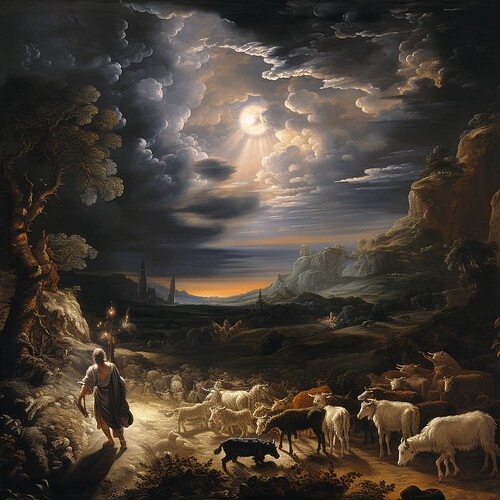![]() January 18: Genesis 31 - Jacob’s Departure and God’s Faithfulness
January 18: Genesis 31 - Jacob’s Departure and God’s Faithfulness
Journeying with God through Challenges and Change
 Introduction
Introduction
As we explore Genesis 31 on January 18, we witness Jacob’s significant decision to leave Laban and return to his homeland. This chapter captures themes of divine guidance, family dynamics, and the fulfillment of God’s promises.
 Genesis 31: Jacob’s Departure from Laban
Genesis 31: Jacob’s Departure from Laban
Genesis 31 narrates Jacob’s departure from Laban after many years of service. It’s a story of divine intervention, familial conflict, and the pursuit of God’s calling.
Key Verse: “Then the Lord said to Jacob, ‘Return to the land of your fathers and to your relatives, and I will be with you.’” — Genesis 31:3
 Key Themes and Reflections:
Key Themes and Reflections:
Divine Guidance in Decision-Making: Jacob’s decision to leave is prompted by God’s command, reminding us of the importance of seeking divine direction in our life choices.
Conflict and Resolution: The chapter deals with the conflict between Jacob and Laban, offering insights into handling disputes and striving for resolution.
God’s Faithfulness in Transition: Jacob’s journey highlights God’s faithfulness and protection during times of transition and uncertainty.
 Today’s Application:
Today’s Application:
Reflect on how you seek God’s guidance in making significant life decisions. Consider how you handle conflicts and strive for peaceful resolutions. Embrace the assurance of God’s faithfulness in times of change.
 Hidden Gem:
Hidden Gem:
Did you know? The stones set up by Jacob and Laban as a witness of their agreement (Genesis 31:45-52) symbolize the importance of tangible reminders in commemorating God’s presence and promises in our lives.
 Reflective Q&A:
Reflective Q&A:
![]() Genesis 31: Jacob’s Departure and God’s Faithfulness
Genesis 31: Jacob’s Departure and God’s Faithfulness
![]() Seeking Divine Guidance: How can Jacob’s experience in Genesis 31 inspire us to seek God’s direction in our decisions?
Seeking Divine Guidance: How can Jacob’s experience in Genesis 31 inspire us to seek God’s direction in our decisions?
A: Jacob’s reliance on God’s guidance reminds us to turn to prayer and seek divine wisdom in our choices, trusting that God leads us toward His purposes.
![]() Navigating Family Conflicts: What lessons can we learn from Jacob and Laban’s conflict and resolution?
Navigating Family Conflicts: What lessons can we learn from Jacob and Laban’s conflict and resolution?
A: Their story teaches us the value of honest communication, the pursuit of peace, and the importance of setting boundaries in resolving family conflicts.
 Join the Discussion:
Join the Discussion:
How does Genesis 31 influence your understanding of God’s guidance, conflict resolution, and faithfulness? Share your insights and reflections in the comments below.
#DivineGuidance #FamilyDynamics #BibleStudy #GodsFaithfulness #GenesisJourney
![]() Continue Exploring Genesis: Join us as we delve deeper into the lives of the patriarchs and discover timeless lessons for our faith journey.
Continue Exploring Genesis: Join us as we delve deeper into the lives of the patriarchs and discover timeless lessons for our faith journey.
 Join the forum!
Join the forum!
Enhance your spiritual journey in our AIgniteScripture Community:
Free Members: Participate in discussions and access biblical resources. Join here: 🌟 How to Join Page - Membership Options
Supporters Membership ($20/month or $200/year): Gain deeper insights with exclusive content, newsletters, and forum discussions. Become a Supporter: 🌟 How to Join Page - Membership Options
![]() Stay Updated with our AIgniteScripture Newsletter: Get daily readings and insights. Subscribe here: https://newsletter.aignitescripture.com/
Stay Updated with our AIgniteScripture Newsletter: Get daily readings and insights. Subscribe here: https://newsletter.aignitescripture.com/
